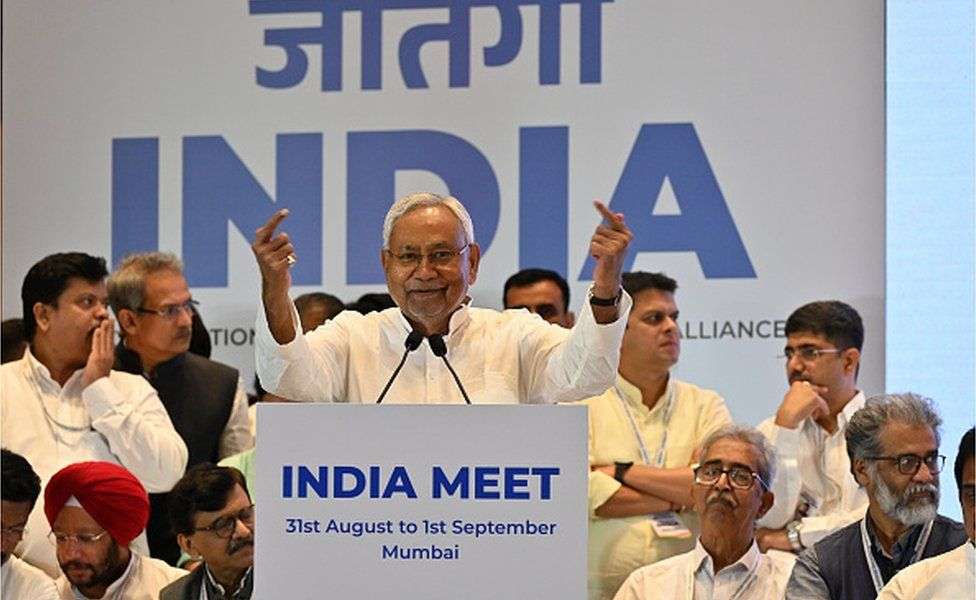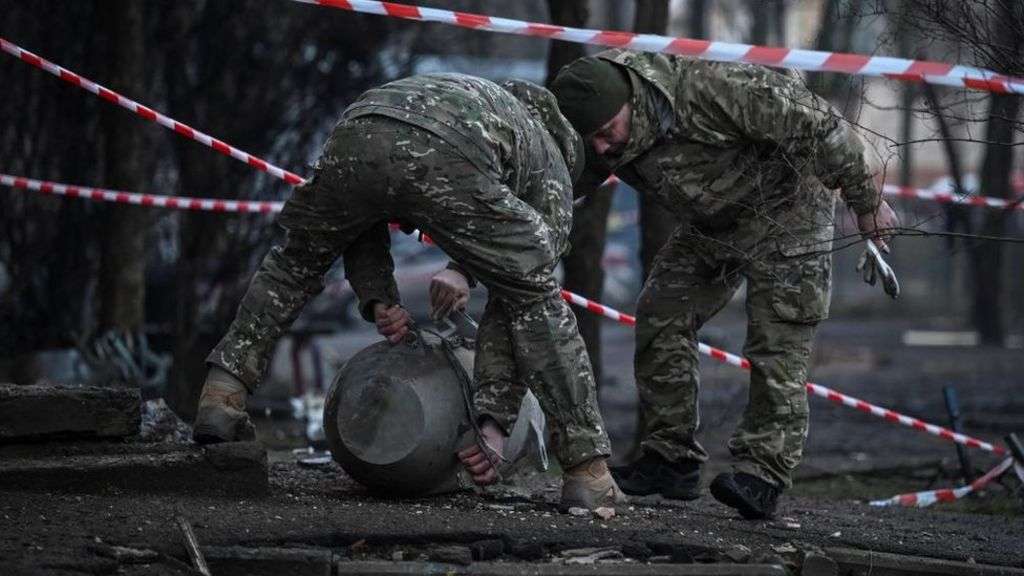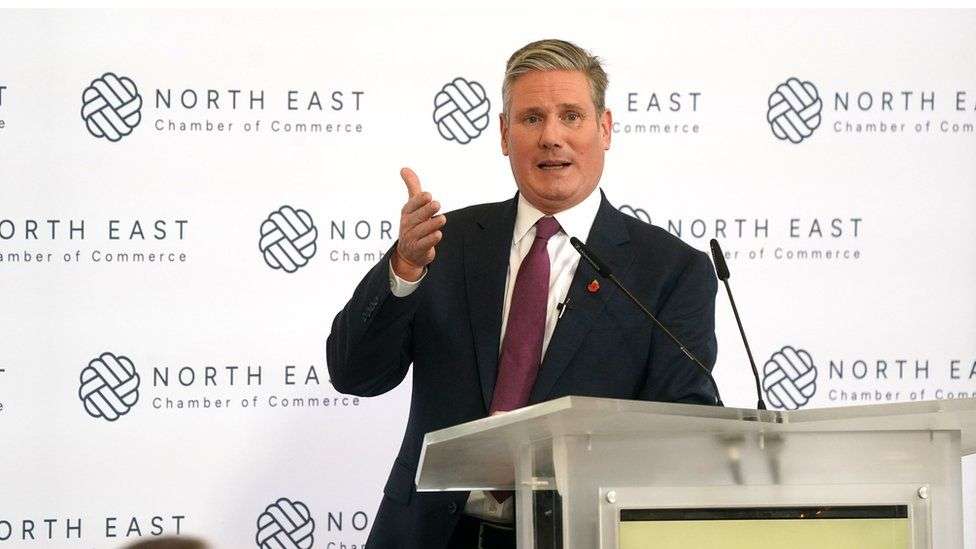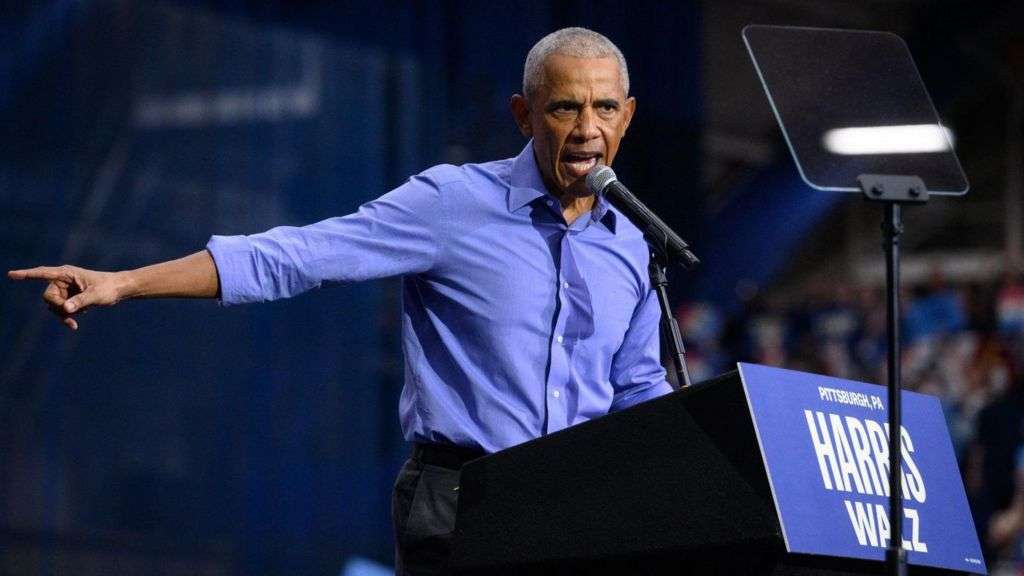In July, over two dozen Indian opposition parties formed a coalition to challenge the ruling Bharatiya Janata Party (BJP) led by Narendra Modi in the upcoming general election.
Made up of the main opposition Congress and smaller, regional parties, the coalition cleverly named itself INDIA, an acronym for a rather florid Indian National Developmental Inclusive Alliance.
The alliance's success hinged on the allies' ability to stick together and agree to a strategic seat-sharing arrangement, ensuring a unified front against the BJP with a single primary candidate in each constituency.
In India's "first past the post" multiparty system where the winner takes it all, a fragmented opposition always benefits a ruling incumbent - in the 2019 general election, Mr Modi's party received 37% of the popular ballot, but mopped up a whopping 303 of the 543 seats.
But barely six months after its birth, India's motley opposition coalition is in disarray. The latest trigger was Nitish Kumar, a regional leader, exiting a state-level ruling coalition in the northern state of Bihar and re-joining the BJP. Mr Kumar had previously departed from a BJP-led alliance 18 months ago. Now the BJP will bank on Mr Kumar's Janata Dal (United) party to pick up a majority of the state's 40 seats.
Turncoats are not uncommon in India's messy politics, but the defection of the doughty 72-year-old Mr Kumar, who was once touted as a potential future prime minister of an opposition coalition, came as a shock to many. "His departure is a big blow to the INDIA alliance. It also sends a signal that the alliance is not working," says Gilles Verniers, a scholar of Indian politics.
That's not all. Two regional leaders in the alliance, Mamata Banerjee of Trinamool Congress (TMC) in West Bengal and Arvind Kejriwal of Aam Aadmi Party (AAP) in Delhi and Punjab, have distanced themselves from the Congress and made it clear that they will go it alone in their respective states. In other words, minimal to no seat-sharing is expected in these states.
The turmoil in this infant alliance comes at a time when Mr Modi looks unstoppable.
In December, the BJP swept Chhattisgarh, Rajasthan and Madhya Pradesh in key state elections in India's sprawling Hindi-speaking heartland. In January, Mr Modi appeared to mark the unofficial launch of the BJP's election campaign for the April and May polls by inaugurating the promised grand new Ram temple in Ayodhya.
"Things have changed dramatically for the BJP after December. The odds in favour of the party's electoral prospects in the elections have increased," says Rahul Verma of Centre for Policy Research, a Delhi-based think tank.
The fragility of the opposition alliance stems, in part, from differing perspectives on the Congress party, led by Rahul Gandhi - it is the sole pan-Indian alternative to the BJP. The party secured less than 20% of the vote and a mere 52 seats in 2019 and continues to struggle.
"It then makes unreasonable demands for seats that regional partners are unwilling to accommodate," says Mr Verniers. "The perception is that the Congress is a toxic alliance partner because of its own weakness and ability to drag down the ticket."
To blame the Congress entirely for the opposition's troubles would be unfair, many believe. In India's intensely competitive political landscape, pragmatism prevails as each party prioritises its own interests.
"Every other member of the [INDIA] alliance is putting their own interest ahead of the general interest. What matters to them is their own state. If they lose the general election can they fall back on the state they rule," says Mr Verniers.
Yet, seat-sharing is only part of the battle. The opposition, say scholars, is unable to provide a compelling alternative narrative to the BJP's popular blend of Hindu nationalism and development. Also, as Asim Ali, a political scientist, says, this narrative enjoys the support of a large section of the media, business and society. "Issues only come to the fore when they have widespread social support," he says.
There's no lack of issues for the opposition to rally around. They have highlighted Mr Modi's "failure" to tackle the acute jobs crisis. They have condemned the BJP's anti-Muslim rhetoric, and its alleged attacks on media and think-tanks and the harassment of political rivals using government agencies. They have united in protest in defence of more than 140 opposition MPs who were suspended for disrupting proceedings in parliament in December.
Yet, as Mr Verniers says, there appears to be no "ideological binding force" uniting the opposition, particularly in relation to the robust Hindu nationalism promoted by Mr Modi and the BJP.
To be true, cobbling together an alliance to take on a well-oiled and amply resourced BJP led by a hugely popular leader is easier said than done. It took decades for the fragmented opposition to come together and defeat the dominant Congress, which ruled India uninterruptedly for 30 years from independence to 1977.
The Janata Party coalition, uniting disparate parties - from socialists to Hindu nationalists - fought against Indira Gandhi's Emergency rule when civil liberties were suspended. (The coalition collapsed within two years due to internal contradictions and personal ambitions of its leaders. But it did succeed in toppling an opponent considered invincible.)
"Only a serious existential crisis or exogenous shock can create conditions for [disparate] allies to come together and put up a formidable challenge to a dominant ruling party," says Mr Verma. "In normal circumstances, it is difficult".
So is the INDIA alliance doomed? "The alliance is in troubled waters, but they can still find ways to contest together," says Mr Verma. The elections hinged on the Congress' performance in over 250 seats in the BJP stronghold of northern and western India, rather than on the outcomes of regional allies in their respective states, he argues.
Mr Verniers offers a solution. "Regional parties are not willing to accommodate the Congress, which still sees itself as a major national player. So the Congress should concentrate on states where it is in direct bipolar contests with the BJP. And it should defer to the regional partners in the rest of the states". Again, as with a lot else in Indian politics, this is easier said than done.








